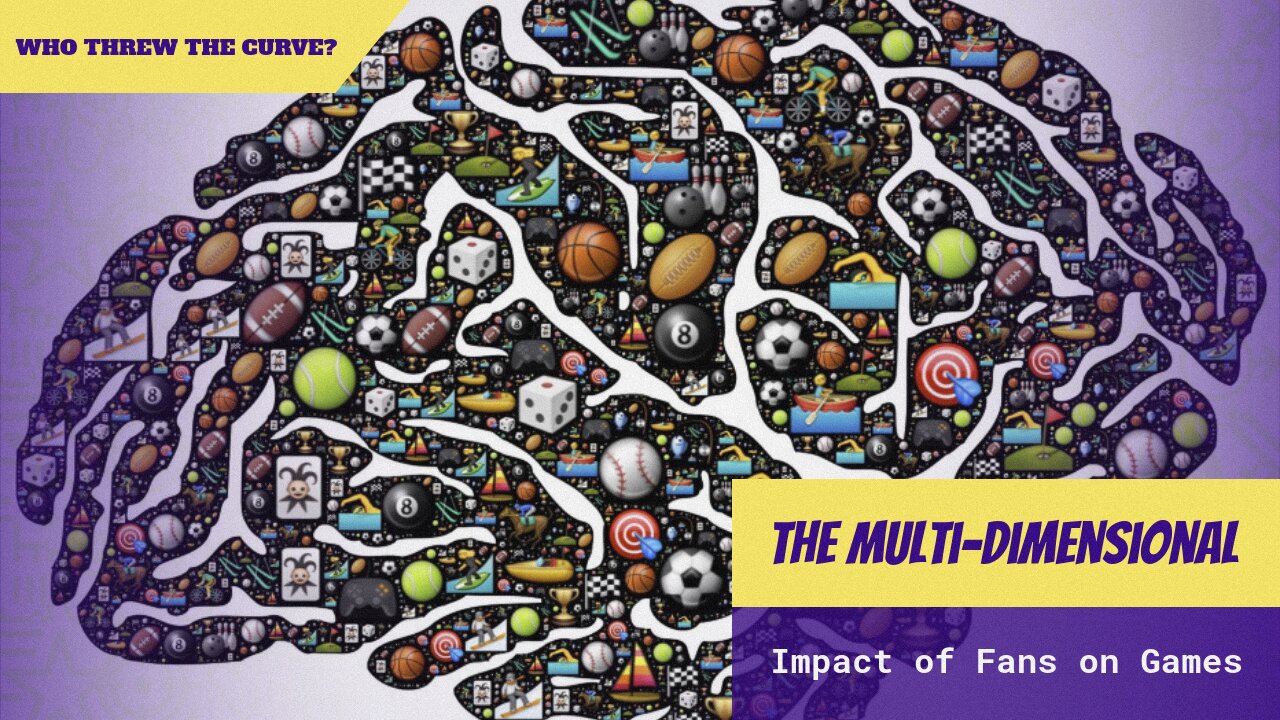Premium Only Content

The Multi-Dimensional Impact of Fans on Games #podcast #foryou #foryoupage #trending #realtalk
The Multi-Dimensional Impact of Fans on Games
In the realm of sports and games, fans are often viewed as the invisible force, shaping outcomes in ways that are complex and multi-dimensional. In sports parlance, they are sometimes referred to as the "12th man" in football or the "6th man" in basketball, emphasizing their significant yet unofficial role in the game. The influence of fans stretches beyond mere moral support and dives deep into psychological, economic, acoustic, and even controversial dimensions that directly and indirectly impact the outcome of games. This essay seeks to explore these facets in a comprehensive manner, focusing on both academic research and real-world observations.
Psychological Impact
Home Advantage
It's an empirically supported notion that teams perform better when playing on their home turf. A meta-analysis by Jamieson (2010) reveals that home teams win more often than not, regardless of the sport. This phenomenon is often attributed to the presence of home fans who act as an emotional catalyst for players.
Intimidation Factor
Crowds can intimidate visiting teams through sheer volume or directed insults and jeers. As early as the Roman Colosseum, home crowds have sought to unsettle opponents to offer their team a psychological edge. The noise and hostility can cause increased stress levels and cortisol production, affecting an athlete's decision-making and performance (Jones et al., 2007).
Confidence and Momentum
The reverse is also true. A supportive crowd can offer an embattled team the emotional impetus to rally from behind, changing the flow or momentum of a game. According to research in sports psychology, the positive affirmation from fans can boost self-esteem and motivation among athletes (Hodge et al., 2013).
Economic Impact
Ticket Sales
A full stadium is a profitable stadium. The revenue generated from ticket sales directly affects a team’s financial health, allowing for investment in better facilities, coaching staff, and athletes. This revenue cycle creates a feedback loop where better performance attracts more fans, and more fans contribute to better performance.
Merchandising
The sale of team merchandise, often driven by fanatical support, is another significant revenue stream. Fans don the jerseys of their favorite players, buy memorabilia, and in many ways, contribute to the branding of the team. This economic capability enables the franchise to compete more effectively on and off the field.
Acoustic Impact
Noise Levels
Crowd noise can affect the outcome of games by hindering communication among players in a team. Audible signals, play calls, and snap counts can be drowned out by a raucous crowd, leading to errors or penalties that could shift the balance of a closely contested game (Nevill et al., 2002).
Chants and Songs
Organized chants and songs serve to lift the spirits of a team or demoralize an opponent. In sports like soccer, the relentless singing of fan groups can act as a twelfth man, offering a kind of psychological sustenance to players on the field (Nevill et al., 1996).
Case Studies
A poignant example would be Liverpool FC's dramatic comeback in the 2005 UEFA Champions League final, often attributed to the unwavering support of their fans who continued to sing the club’s anthem, "You’ll Never Walk Alone," despite being 3-0 down at half-time. Similarly, games played in empty stadiums during the COVID-19 pandemic exhibited a noticeable drop in home advantage, further highlighting the psychological importance of fans (Parnell et al., 2020).
Controversial Aspects
Fan Misbehavior
Unfortunately, the impact of fans is not always positive. Instances of hooliganism, pitch invasions, and even racial abuse can mar the spirit of the game, causing unnecessary distractions and sometimes leading to abandonment of matches.
Inequality of Fan Support
Certain teams benefit from a large, global fan base, which can travel and create a "home" atmosphere even in away games, while smaller teams might not enjoy such luxuries. This inequality has led to debates around the fairness of fan influence in games.
Counterarguments
While the role of fans is significant, it's also necessary to consider the primacy of skill, training, and tactics in sports outcomes. Professional athletes often learn to tune out crowd noise, and some even thrive under hostile conditions.
In sum, the role of fans in games is a subject of ongoing intrigue and importance, affecting not just the psychological well-being of players but also the economic and acoustic dynamics of sporting events. The multi-dimensional impact of fans, although nuanced, is significant enough to warrant attention from both academics and practitioners in the world of sports.
#FanImpact #12thManEffect
#AcousticGameChanger #GameDayExperience #SportsAndFans #HomeAdvantage #FanBehavior #FanEconomics #CrowdNoise #FanPower #TeamSpirit #MomentumShifters
#IntimidationFactor #LevelPlayingField #SportingControversies
-
 9:48:25
9:48:25
Rallied
14 hours ago $19.36 earnedWarzone Solo Challenges All Day w/ Ral
102K6 -
![Aug Day #10 of RCP 🤟 [FR/ENG] 🫶 Some Fortnite then Demos then continue on StarRupture 🫶 🤟](https://1a-1791.com/video/fww1/81/s8/1/O/0/c/-/O0c-y.0kob-small-Aug-Day-10-of-RCP-FRENG-Som.jpg) 4:24:45
4:24:45
Deaf Gamer Girl
12 hours agoAug Day #10 of RCP 🤟 [FR/ENG] 🫶 Some Fortnite then Demos then continue on StarRupture 🫶 🤟
51.6K2 -
 6:59:09
6:59:09
Reidboyy
16 hours ago $12.42 earnedBattlefield 6 #1 POV (Watch and Learn)
97.6K4 -
 2:25:42
2:25:42
TheSaltyCracker
11 hours agoThey So Mad ReEEeStream 8-10-25
131K289 -
 2:27:39
2:27:39
vivafrei
19 hours agoEp. 276: Epstein Subpoenas &Trump E.O! Bondi Offers Reward for Maduro Arrest? MADNESS IN CANADA!
152K145 -
 2:23:55
2:23:55
Barry Cunningham
14 hours agoPRESIDENT TRUMP IS NOT PLAYING AROUND...AND THE LIBNUTS CAN'T STOP HIM!
104K65 -
 22:02
22:02
Stephen Gardner
20 hours ago🔥JUST IN: Trump BETRAYAL plot EXPOSED!
128K311 -
 38:32
38:32
The Why Files
21 days agoThe Real CIA Vol. 1: 693 Pages of Secret Crimes
138K61 -
 49:12
49:12
MattMorseTV
17 hours ago $23.18 earned🔴Zelenskyy is NOT HAPPY about Trump’s NEW DEAL.🔴
131K162 -
 1:03:49
1:03:49
Warren Smith - Secret Scholar Society
4 days ago"You are on the brink" - My Conversation with Nick Fuentes
95.3K67